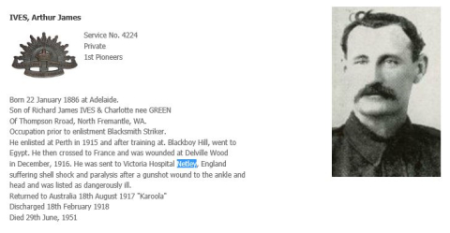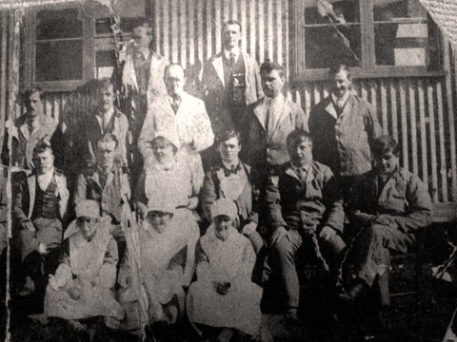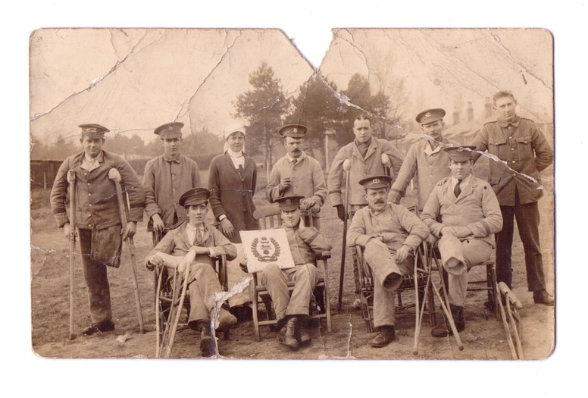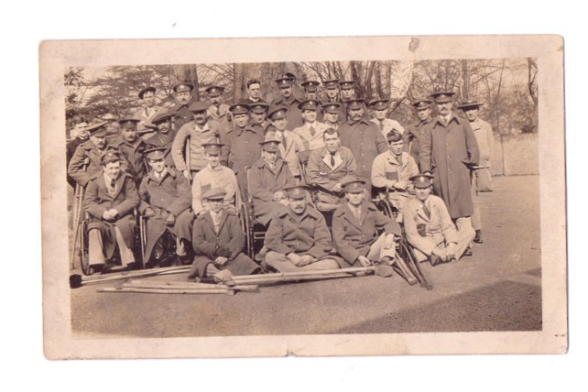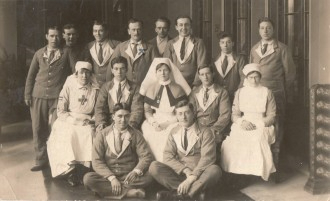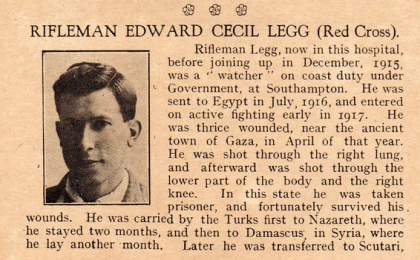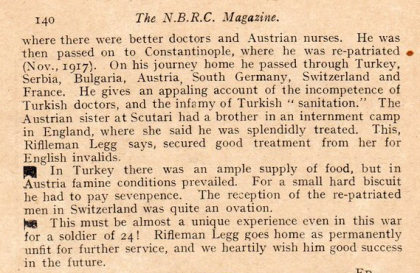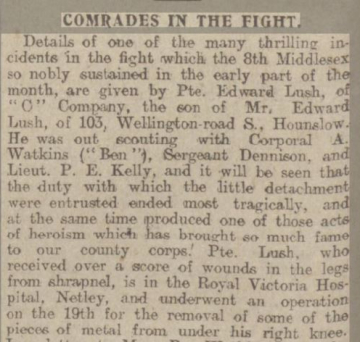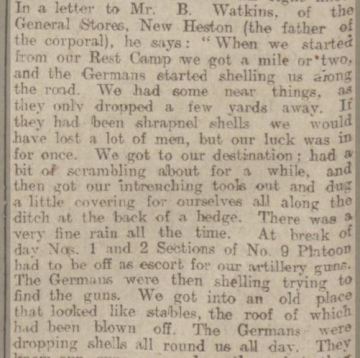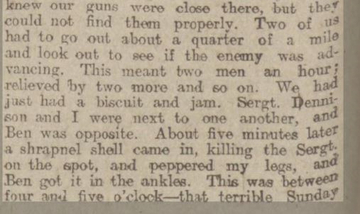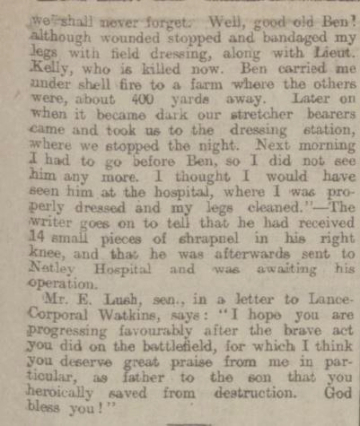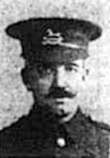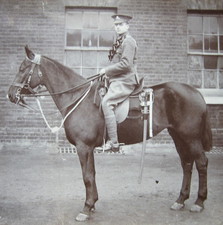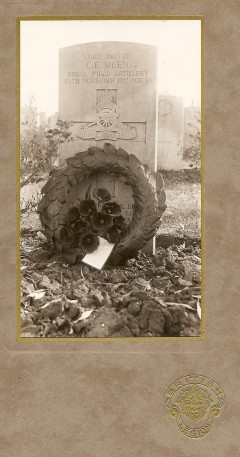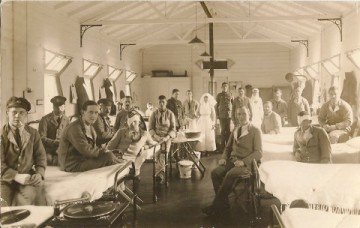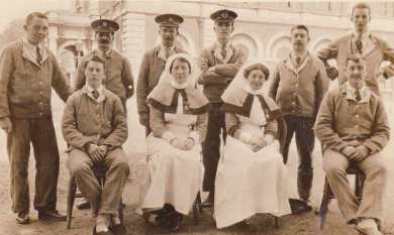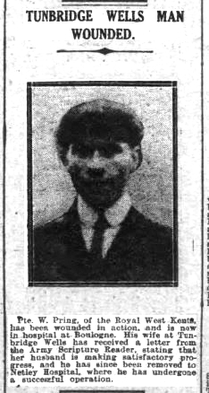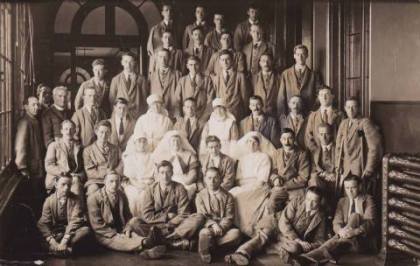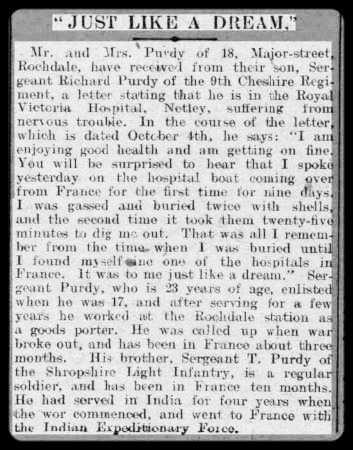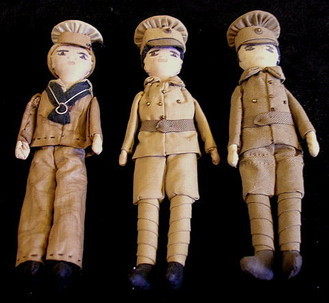
North Bucks. Times 1916 Sep. 26th Tue. www.mkheritage.org.uk
Private Harry KENT, the son of Mr. E. Kent, of George Street, Wing, was badly wounded in the shoulder and right arm in the fight at Guillemont. From Netley Hospital he writes;
“I am still in bed, and by another operation they have taken some more shrapnel bullets out of my muscle. This time my arm is also badly fractured, but I am getting on as well as can be expected.”
When wounded, he had been in France for fourteen months, and before the war was employed in the gardens at Ascott.
Edward Cecil LEGG from the Netley British Red Cross Magazine August 1918
Pte Edward LUSH. Middlesex Chronicle 29th May 1915
Lieutenant Archibald Cecil MARGRETT was a patient in the hospital for six years...
I received this newspaper article from Richard Coomber. He is researching the effect of WWI on Shipley in West Yorkshire and when he saw it was from a soldier in Netley hospital, asked if I would like it. Thanks Richard.
Jesse MARSHALL from Eccleshill, near Bradford, West Yorkshire was fighting his second war, having won medals in the South African campaign.He was recovering in the Royal Victoria
Hospital, Netley near Southampton when he wrote home to a friend.
‘I am going on fine, much better than ever I expected,’ he wrote.‘My thigh is badly damaged but under the most skilful treatment it is doing wonders.
‘There are a lot of Lancashire fellows laid in here and three Burnley chaps are in my ward so you may guess we are having some fine sport. The nurses are splendid and are at it from daylight to
dark.
‘I think myself lucky to have got through as well as I have for I might easily have been wounded in the head and in that case I should still have been in France along with thousands more, never to
return.
‘As I have lain here in bed quite comfortable and have thought of the poor lads in France, I have shuddered to think of it for only those who have gone through it know what the hardships really are.
‘I have had thirteen weeks in the cold, wet trenches and the sensation is far from pleasant. But there is a Yorkshire saying “Tha can get
used to owt.”
‘My opinion of the Germans is this that they are not worth talking about. Their day of retribution will come and God help them when it does. I would dearly love to be in at the kill. ‘It is terrible
to think of the lives that have already been lost but there is sure to be some long list of casualties before the war is finished. Those who are comfortable at home and read the papers cannot dream
of the horrors of this war.
‘I am living in hopes of coming home by Easter and then I can chat with you about my experiences at the front.’
Shipley Times & Express 12 March 1915
HOSPITAL EXPERIENCE
BY GUNNER FREDERICK GERALD McAVITY
BEING wounded on November 9th, my first stop was at a stationary hospital, Rouen, France. I had one operation there, and had some shrapnel removed from my body. One of the pieces was taken from my left shoulder; a nice-sized piece, which is shown in the photograph illustrating this story. When I came to, after being under the operation, I felt something hard on my shoulder. The nurse, seeing that I did not pay much attention to it, came to my bed and asked me if I did not want my souvenir, meaning my shrapnel. Well, as I was in great pain at that time, I did not prize it very much, but I value it quite a lot today.
After a few months in France, they moved me to a Red Cross hospital at Southampton, England, called Netley hospital. I had a long stretch of hospital life in Netley. When I was sailing from France to England, aboard the hospital ship, they asked me where I would like to go. Naturally, being a Canadian, and having no relatives over there, I promptly said, London,[94] so I could meet some of my pals. When I got off the boat, and aboard the hospital train, I asked the orderly if I was near London, and he gave the answer: "Don't worry. You are not going to London. You are on your way to Netley, and will be there in ten minutes."
I was a little downhearted at first, but after a few weeks, I was satisfied with my treatment, which was the very best.
When I got my little lot of wounds, on the Somme, I also was exposed to gas shells, which left my stomach in such a condition that I could not eat for two months until after I had that sea voyage from France to Netley. The nurse there asked me if I would try a poached egg on toast, and that was my turning point. From that day until the day I was discharged I have not missed a meal, except after an operation.
I had nine operations altogether, eight in the Netley Hospital at Southampton, England. After the shrapnel was removed, the doctor found out that the bone in my shoulder was severely fractured, and I had four different operations, just to clean out the loose bone which was keeping my wound from healing. All the time I was in the hospital and even until three months ago my arm was completely paralyzed. But through the wonderful treatment they gave [95]me I am very glad to say I have pretty good use of my left arm.
Another one of my large wounds was in my left thigh, where I lost about eight inches of flesh, from the knee up. I have had four operations on this limb. I lay for eight months in suspense, awaiting the official word, whether I would have to lose the left limb. I can honestly say I had a great deal of confidence in my surgeon, and one day he came to me and had a personal chat with me. He talked to me just like a father. He asked me if I thought I could stand another operation because he stated that I was in a pretty bad condition. I was very anxious to know his view on the subject as I put all confidence in him. I promptly asked him his decision, and he replied that he thought I could stand it. Knowing he thought I could pull through, it did not take me long to let him do anything to get me healed up.
The operation was performed and I had all the skin taken from my right thigh and grafted on the wound on the left. I can say it was a success, and after a few months I was able to get along on a cane. The doctor, seeing I was able to move about, had me sent to a Canadian Hospital so I could be boarded and sent to Canada.
I was in the Canadian hospital for about a month and was very anxious to see my native land again, when one day at noon the word came for me to pack up and get ready for the boat.
After nine days at sea on a hospital ship, with all lights aglow, at the time the Germans were sinking Red Cross ships, we pulled into Halifax, N. S., safe and sound. Here I was detailed off for a hospital, after I had my furlough, to visit my relatives.
After I had seen my people, and was exhausted from talking, and shaking hands with old acquaintances, I reported to hospital again in St. John, N. B., Canada, where I received electrical and massage treatment.
At that time I could not bend my knee, and my leg was stiff, but through the wonderful treatment, and my own will power, I finally got very good use of it before I got my discharge, May, 1918..org
www.gutenberg.org
Charles Ernest MEEN 53005 was in Netley hospital in February 1915 age 22. He writes to his sister:
Ward B 37
Royal Victoria Hospital
Netley
Feb 25th 1915
'My Dear Sister
I am back in England again and as you see still in hospital. I have been in bed 8 weeks now with my wounds but they are healing up alright now and I hope soon to be up and I shall then be able to ?
at leave and come see you if I don't forget . I hope you are in the best of health also Sam . I cannot write much as my hand is stiff I've had my little finger shot off and also through the stomach
but ? are getting better so goodbye for now and let me have a ?. With love to you and Sam from your loving brother Charlie xxxx'
Shortly after writing this letter, he was posted back to the front.
He was killed on the 28th November 1917 and is buried in Vlamertinghe New Military Cemetery.
Thanks to Mel on ancestry for the photos and letter.
Pte. F. MORLEY
Bucks. Standard newspaper. 1915 Nov. 20th. mkheritage.org.uk
Private F. Morley, of Newport Pagnell, is in Netley hospital recovering from enteric and typhoid fever, contracted whilst on active service at the Dardanelles. He joined the A.S.C. as a baker on June 26th, and of his experiences writes;
“On July 13th, 1915, I sailed with the 40th Field Bakery for the Dardanelles. After staying at Alexandria (Egypt) for two days - we had a good time, I can tell you - we started off again for the Peninsula. After a very exciting race with a submarine and rather a rough journey, we found ourselves within the shell-fire radius. The Turks had several shots at us, but fortunately for us they made a miss every time. We landed on the Peninsula on August 3rd, and joined the 42nd Field Bakery. It was more dangerous down at the base than in the trenches, as the Turks would insist upon sending storms of shells in our direction. While baking we had to dodge the shells by hiding behind anything near at hand. I well remember one of our fellows flinging himself behind a tent peg, hoping this would shelter him from the whizzing shell. We were told that we were the only Field Bakery in the British Army working under heavy shell fire. I fell ill with enteric and typhoid fever. I was put aboard the hospital ship Delta and subsequently brought to England and found myself booked for Netley Hospital. I have been here about nine weeks now, making eleven weeks’ illness. I am looking forward to being home at Christmas.”
The following lines are those composed by Private Morley;
“Though he is lying in the trenches,
And the battle raging hell,
His thoughts are of the dear old home
In the little woodland dell.
He pictures his dear sweetheart,
As days go slowly by,
Waiting with a noble courage,
Tho’ tear-drops dim her eye.
He lives again in dreamland
The hours they used to roam,
And wonders if he will be spared
To see the dear old home.
He tells them not to pine for him,
Tho’ sorrow fills their heart,
For you, dear ones, must help the cause,
The waiting is your part.
And tho’ the harder task by far,
It is your lot to bear;
Cheer up, for brighter days shall dawn,
When joy will crush despair.
For the weary wait will cease, love,
And our duty will be done,
When we sail for dear old England,
With the mighty conflict won.”
One of our (local) Australian Soldiers admitted to Netley Hospital on 7th February 1918 MULLINS Michael (AKA MICK) -born Charters Towers 2458-Charleville, Queensland 9th Battalion, 7th Reinforcement- Brookwood Military Cemetery (Plot IV, Row B, Grave No. 12), Surrey, England. Thanks to Joanne Klein for this information.
Pte. J. S. NAIRNE
Pte. Reginald O'DELL
Bucks.Standard newspaper. 1915 May 29th. www.heritage.org.uk
News has been received that Private Reginald Odell, the son of John Odell, the well known ironmonger and implement agent of Newport Pagnell, is suffering from four shrapnel wounds. He is now in Netley Hospital, having received the injuries in the battle of Richebourg on Sunday, May 15th. His worst infliction is in the region of his thigh, but he is making as satisfactory a progress as may be expected. He volunteered for service with the Oxon and Bucks Light Infantry shortly before Christmas, and had been at the front for about five months.
(During the next few weeks, Private Odell would make a full recovery from his wounds, to spend a few days with his parents after leaving hospital. He would then be sent to the British Expeditionary Force’s base in France, prior to returning to the front.)
This email was from Alan Riley who visited the park and took part in a tour with Owen in 2016. he says:
My Grandfather was No.1172, Gunner Ernest James (Jim) PEACH who enlisted in the Royal Field Artillery on 2nd September in 1914. He arrived at Suvla Bay, Gallipoli in the early hours of 7th August 1915 with ‘A’ Battery, 59th Brigade RFA, 11th (Northern) Division. He was evacuated on 13th December 1915 on HMHS Assaye to Malta and I am very fortunate that these records are still in existence. He nearly died on Malta suffering from paratyphoid but he recovered sufficiently to be invalided back to Engalnd on the Hospital Ship Egypt, arriving at Netley on 4th April 1916. His stay was quite brief as he was transferred to Addington Park War Hospital on 20th. The doctors performed tests for Typhoid, Paratyphoid and Dysentery organisms. The signature is difficult to read, but the Medical Officer in charge looks to be H. McAllen, (McAllison?) though you must forgive me as it is not clear.
My Grandfather has no Silver War Badge and far from being invalided out of the army, he joined 2nd Battery, 13th Brigade RFA and was in Mesopotamia by January of 1917 where he remained until the end of the war. Thank you Alan.
Private Joseph PURDUE
Julie Bussell's Grandfather was Joseph Purdue and here he is receiving the D.C.M. at Netley.
133007 Pte. J. Purdue 45th Battalion was awarded the Distinguished Conduct Medal "For conspicuous gallantry and devotion to duty during operations, August 7th to 11th 1919. He carried a wounded officer for four hours through marsh and forest, and, when the enemy attacked, he showed great coolness while helping to repel the attack.
(13th July 1920) From Ancestry.co.uk
Thank you for letting me use the photos Julie.
